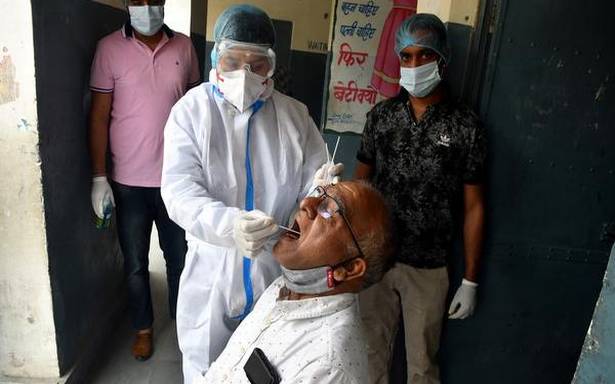Maharashtra shows highest rise, Kerala biggest decline in the last two weeks.
The COVID-19 active caseload has reached 1,59,590 on Saturday with Maharashtra, Kerala, Punjab, Karnataka, Tamil Nadu and Gujarat registering a surge in cases in the last 24 hours. Maharashtra continues to report the highest daily new cases at 8,333, followed by Kerala (3,671) and Punjab (622), said the Health Ministry on Saturday.
India reported 16,488 new cases in the last 24 hours.
“Eight States — Maharashtra, Kerala, Punjab, Madhya Pradesh, Tamil Nadu, Gujarat, Karnataka and Haryana — are displaying an upward trajectory in daily new cases. In the last two weeks, Kerala has shown the biggest decline in the number of active cases, from 63,847 on February 14 to 51,679 while Maharashtra has shown the highest rise, from 34,449 to 68,810,’’ said the Ministry.
Six States/UTs account for 82.3% of the 113 deaths reported in the last 24 hours. Maharashtra saw the highest number of casualties (48). Punjab follows with 15 daily deaths and Kerala reported 14 in the last 24 hours while 17 States/UTs have not reported any deaths in this period.
The Ministry’s data shows 1.07 crore (1,07,63,451) people have recovered so far and 12,771 have recovered and were discharged in the last 24 hours.
As the second phase of vaccination, which will see greater participation by the private sector, is about to roll in from March 1, Girdhar Gyani, director general, Association of Healthcare Providers (AHPI), said India has more than 3,000 private hospitals of more than 100-bed capacity, which will have the requisite infrastructure and can vaccinate almost 100 persons per day.
He said 25,000 hospitals have bed sizes between 30 and 100. At least 50% of these can be identified as vaccine delivery centres. These hospitals, along with government facilities, will be able to boost the drive during the third phase.
“According to estimates, we may need 1.3 lakh-1.4 lakh vaccination centres, 1.0 lakh healthcare professionals and 2.0 lakh support staff/volunteers for mass-inoculation of 30 crore prioritised individuals including healthcare workers, frontline workers (people above 50 years and also with co-morbidities) by August 2021 and the entire adult population (80 crore) by the end of 2022. Hence, the role of private providers would be critical in giving a push towards universal immunization. Private hospitals — big and small, and even a clinic would help in the inoculation process and that would reduce pressure on government-run hospitals,’’ he said.
Following the dispatch of the first batch of 600,000 doses to Ghana from the Serum Institute of India earlier this week, Yasmin Ali Haque, UNICEF representative in India, told The Hindu: “These vaccines have been provided under the COVAX Facility — an initiative to provide equitable access to vaccine. It is a major step in the global effort to beat this pandemic and a landmark achievement towards global equitable access to these life-saving vaccines.’’
Source: Read Full Article

